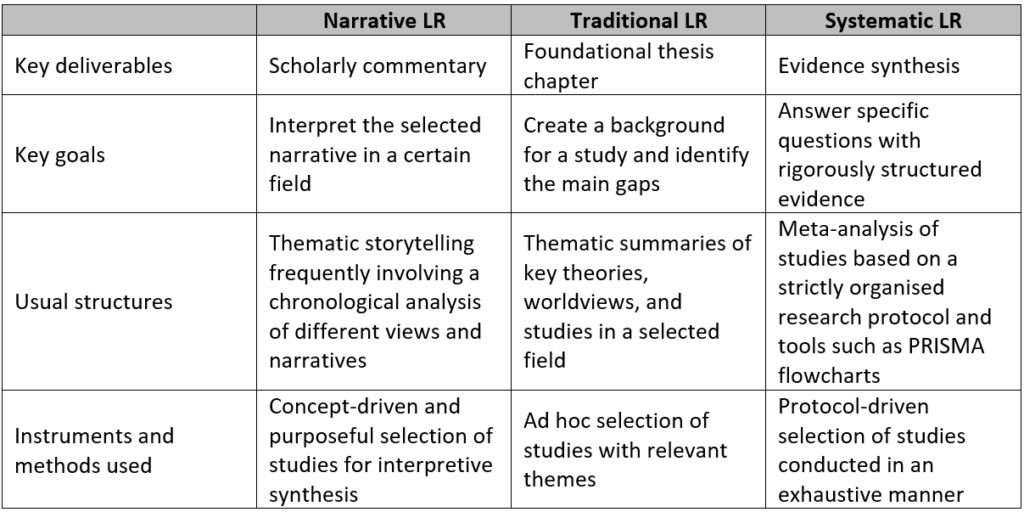PhD Narrative Review Writing Service
What Is PhD Narrative Review Research and Narrative Review Writing?
A literature review (LR) is a ‘rite of passage’ for any PhD student. However, not all of them are created equal. While systematic literature review writing seeks to provide an overview summarising existing research in the field, objectively. Narrative review writing adheres to a more interpretivist and subjectivist stance.
A narrative literature review aspires to demonstrate ‘the big picture’ by providing a critical synthesis connecting ideas across multiple studies. Narrative reviews also accept interpretation and subjectivity and explicitly acknowledge the position and perspective of the author in discussing and contextualising the findings. Let's find out what makes PhD narrative literature review writing different from a usual PhD literature review.
What Makes Narrative Literature Review Writing Different?
Here's a brief overview of the key differences between narrative literature reviews and traditional/systematic literature reviews.

Get PhD Narrative Literature Review Help from Expert Writers
When Should You Choose a PhD Narrative Review?
Most PhD narrative review writing experts suggest that this type of review can be useful when you need to:
- Map the conceptual evolution of some ideas in your field of choice. For example, tracing the definitions of corporate social responsibility as a concept may require the use of such a longitudinal strategy.
- Identify main theoretical gaps in some sphere. This way, you can consider multiple theories and models and decide whether they are successful in explaining certain phenomena.
- Contextualise debate in developing fields of knowledge. If your research project is focused on a rapidly developing sphere of science and/or is interdisciplinary, a narrative review can help you bridge the gaps and present a coherent overview of the current situation in it.
For the same reasons, narrative literature reviews are not suitable for cases where you need to use statistical aggregation or clinical guidelines.
How Can You Conduct a Quality Narrative Litature Review?
In light of the differences listed above, you need to consider the following ideas to write a high-quality narrative review.
1. Explain why you decided to use the narrative approach for your literature review.
You can use the reasons listed above or expand them with your own ideas. Keep in mind that the need for interpretivism and subjectivity in PhD narrative literature review writing must be well-substantiated to please your examiners.
2. Define your methods, focus areas, and scope.
While narrative reviews permit greater flexibility and subjectivity than systematic reviews, this does not mean that they do not imply high levels of academic rigour. Make sure that you explicitly describe your boundaries, scope, focus area, methods, inclusion and exclusion criteria, and the methods you will use to synthesise and analyse the findings.
3. State your narrative review subtype.
Literature reviews based on the narrative approach come in many formats, including critical, integrative, and meta-narrative versions. Make sure that you clearly identify the type you have selected and have justified your choice for the readers.
Original PhD Narrative Review Writing Services
PhD narrative literature review writing is a challenging task even for experienced academic researchers. If you have limited prior experience in this sphere, using PhD narrative review writing help may be a reasonable decision to ensure that you achieve superior results and minimise the guesswork. Here is how we can assist you with this:
1. Custom Outlines and Conceptual Frameworks
In many cases, PhD students just need a little push to overcome the ‘blank page paralysis’. A clearly defined outline or conceptual framework can help you see the bigger picture you may be missing.
2. Literature Selection and Synthesis
If you have plenty of work to do in a short period of time, you can't waste days chasing dead-end leads and sifting through dozens of irrelevant papers. Skilled writers can provide you with a list of high-quality sources for your field of interest, accompanied by brief annotations allowing you to develop a solid line of argument much faster.
3. Methodological and Academic Rigour
A PhD narrative literature review is a challenging piece of writing in comparison with traditional and systematic literature reviews. Hence, both university supervisors and high-impact journals accepting your publications will probably be meticulous in their review of your submissions. Even if you give it all that you have got, it is highly probable that our team of skilled experts will still find some weak points and areas for improvement and make your final LR version truly impeccable.
Order custom PhD writing help from our expert supervisors today and complete your thesis in time!

